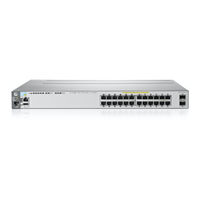HP E3800-24G-2XGT-PoE+ tl Manuals
Manuals and User Guides for HP E3800-24G-2XGT-PoE+ tl. We have 1 HP E3800-24G-2XGT-PoE+ tl manual available for free PDF download: Access Security Manual
HP E3800-24G-2XGT-PoE+ tl Access Security Manual (732 pages)
Switch Software
Table of Contents
-
-
Introduction
31
-
-
-
Overview
51 -
-
Restrictions71
-
-
-
-
-
Overview
115 -
Terminology
123 -
-
Overview162
-
-
-
Client Status
185
-
-
-
Overview
187 -
-
Before You Begin193
-
-
-
Operating Notes216
-
Overview217
-
-
-
Terminology219
-
-
Terminology
220 -
-
-
Limits
286 -
Overview
292 -
-
Acls325
-
On the Switch327
-
-
Overview333
-
Terminology335
-
-
Overview
336 -
-
Overview365
-
-
Overview
366
-
-
-
Terminology
366 -
Authentication
370 -
-
Introduction381
-
Displaying Acls387
-
Terminology388
-
Overview393
-
-
Deleting an ACL
465 -
-
-
-
Introduction511
-
-
Introduction
512 -
DHCP Snooping
512 -
-
Operating Notes
544 -
-
Filter Indexing569
-
Overview573
-
Terminology
580 -
-
X Open VLAN Mode
604 -
Overview
649 -
Overview
650 -
Port Security
650 -
MAC Lockdown
671 -
MAC Lockout
679 -
Options
691 -
Access Levels
692 -
Terminology
704
-
Advertisement
Advertisement
